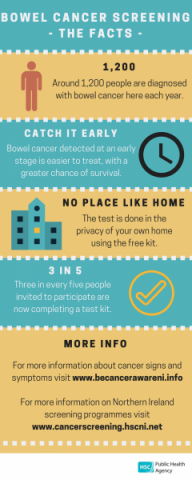Detecting bowel cancer early saves lives

The Public Health Agency (PHA) is using Bowel Cancer Awareness Month (1-30 April) to encourage everyone who is eligible to make use of the bowel cancer screening programme, and to be aware of the early signs and symptoms of the disease.
Dr Tracy Owen, Consultant in Public Health Medicine at the PHA, said: “Bowel cancer is one of the most common cancers in Northern Ireland with about 1,200 people diagnosed with the disease each year. However, the good news is that the earlier bowel cancer is detected, the more successful the treatment is likely to be.
“Men and women aged between 60 and 74 have the opportunity to take part in the Northern Ireland bowel cancer screening programme. Those eligible for screening receive a free test kit in the post at the home address provided by their GP. The kit is used to detect traces of blood in the bowel motion that are not visible to the naked eye. Most people who are tested will have no blood in their bowel motions and will be invited to repeat the screening test again in two years’ time. If any blood is detected, this indicates that further tests need to be carried out.
“Being asked to use the home screening kit and collecting a sample of your bowel motions can be daunting and embarrassing, as no one likes to talk or think about such things. However, three in every five people invited to participate are now completing a test kit. The screening test helps to find cancer at a very early stage before symptoms even start to appear.”
Bowel cancer can occur at any age, and symptoms can include:
- rectal bleeding or blood in your bowel motion;
- a change in bowel habit that last for more than six weeks;
- unexplained weight loss;
- pain or swelling in your abdomen;
- extreme tiredness for no obvious reason.
“While in many cases there will be a simple explanation, it is important to seek advice from your doctor as such symptoms may be an early sign of bowel cancer.
“If you have any signs or symptoms see your GP. If you receive the screening test kit in the post, take action – it could save your life.”
For more information about cancer signs and symptoms visit www.becancerawareni.info
For more information on Northern Ireland screening programmes visit www.cancerscreening.hscni.net
